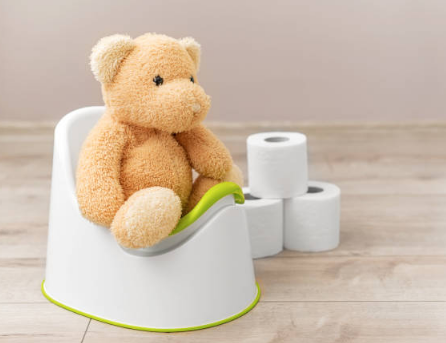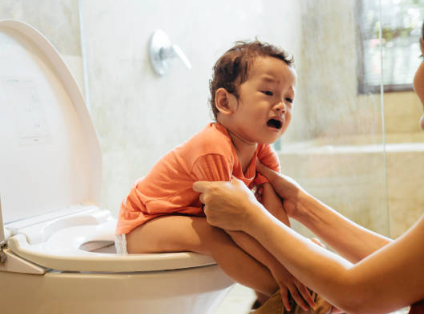Potty training is hard work, and parents often breathe a sigh of relief when their child finally gets rid of the diaper. But what if they suddenly have another accident? As it turns out,”occasional setbacks are common in the first days, months, or even years of potty training,” says Scott J. Brown, a pediatrician at Chicago’s Northwestern Children’s Clinic. J. Goldstein, M.D., said. Read on to find out why a child may take a few steps backwards and what parents can do to deal with toilet training regression.
What Causes Toilet Training to Deteriorate?
Deterioration occurs when a potty-trained child begins to have frequent accidents, which may necessitate the reuse of diapers. While setbacks can be frustrating, it’s also completely normal and can often be resolved by finding out why.
Mark Wolraich, MD, chief and director of the Division of Developmental and Behavioral Pediatrics at the University of Oklahoma Health Science Center, explains,”Try to find out the cause of the deterioration because addressing these issues will help the child get back to where it was. “The head of the Children’s Research Center.

Be aware, however, that accidents that occur at night are common, and this is not necessarily a sign of deterioration in potty training. “Many children don’t dry out at night for years after being dry during the day,” says Dr. Goldstein. “The control of nighttime and nap time is very different from the control during the day.”
Here are some possible causes of toilet training degradation.
Your child is not actually potty trained
Start by asking yourself if your child is actually potty trained. “Remember, a child who is really potty trained should want to go to the toilet. So a child who has several accidents a day and doesn’t seem to care about them shouldn’t really be considered ‘potty trained’,” says Dr. Goldstein. If you think you may be trying potty training too soon, talk to your pediatrician about the best time.
They feel stressed
Many children begin to have accidents during the transition period, which can be stressful, such as starting a new school or welcoming a new sibling. Once your life settles down, your child will most likely master potty training again.
Your child has a health problem
Medical problems can also lead to deterioration of toilet training, and constipation is a common problem. If a child has difficulty having a bowel movement, they may avoid the potty altogether to avoid pushing and straining too hard. Make sure they are getting enough fiber and plenty of water, and talk to your child’s pediatrician if you’re concerned.
They get easily distracted
Your child may become so preoccupied with what they are doing that they lose sight of the urge to go. Once something happens, they don’t have enough time to go to the bathroom.
They are afraid of the potty
Some children are really anxious about going to the toilet. They may be afraid that they will fall in, that the sound of flushing may scare them, or that they may even be afraid of the “toilet monster”.

They may have health problems
Sometimes, a child’s toilet training is regressed due to the presence of an underlying health condition. For example, urinary tract infections and new-onset diabetes are two important conditions that can lead to deterioration in toilet training. While these are the more serious reasons for the increase in toilet accidents, it is important to discuss your child’s accident with a medical professional to rule out other issues and prevent delays in diagnosis.
How to Deal with Toilet Training Degradation?
Thankfully, regression is often short-lived, and parents can get their children back on track within a few days or weeks. Wendy Sue Swanson, MD, a pediatrician at Seattle Children’s Hospital, said,”Although you may feel frustrated when you have to get into accidents and diapers again due to degraded potty training, do everything you can to stay positive. Follow these tips to combat potty training degradation.
Never punish your child for an accident
If your child has an accident, don’t show disappointment. Your disappointment can make your child more anxious, which can lead to more toilet problems. When you check if your child is dry, applaud and cheer if they don’t have an accident. If not, keep it unbiased and say,”Oops. You had an accident. Let’s go to the potty.”
Remember to stay optimistic and don’t yell or scold your child. “You want your child to feel empowered without worrying about being punished for making mistakes,” explains Lisa Asta, a clinical professor of pediatrics at the University of California, San Francisco.
Give gentle reminders
Usually, accidents happen because the child is having too much fun or doing a certain activity and they don’t want to stop and run to the bathroom. To address the situation, Dr. Goldstein says, explain to the child that sometimes it’s normal to forget to use the potty and reassure the child that they are still a “big child.”
“Then take them to the potty every few hours at home and ask their teachers to make sure they go to the potty often. Simple, gentle reassurance and reminders to use the potty will get the child back on track. Encourage your child to try using the potty at least when they first wake up, before meals, before bedtime, and before you leave the house.
Try a reward system
Give your child some incentives for staying dry, especially if the reward is effective when you first train them to go to the toilet. For example, give your child a sticker every day so they don’t have an accident. After a few days of success, you can give them even bigger rewards, such as a trip to an ice cream parlor, a small toy, an extra few minutes of bedtime reading, etc.
Keep in mind that rewards are not for every child, and in some cases, rewards can be as anxiety-inducing as punishments. That’s why the most effective reward is often your one:”You’re such a big kid!” Or “you’re so independent” can sometimes be the best motivator.

